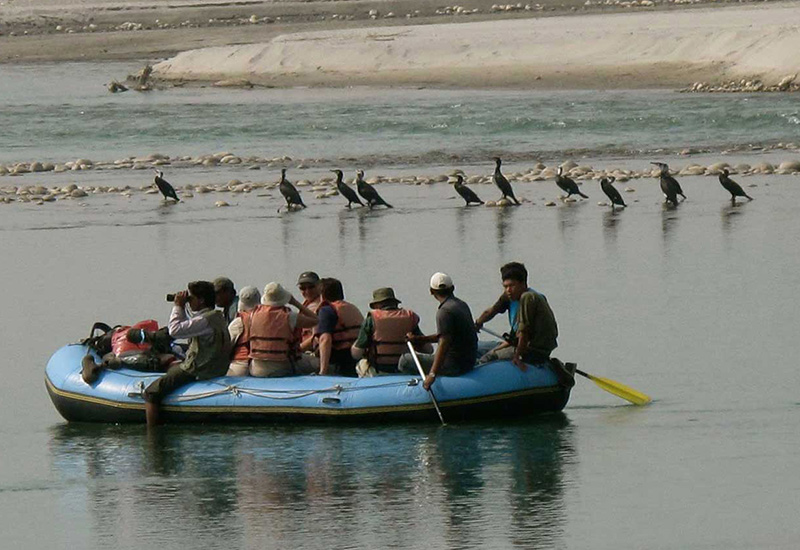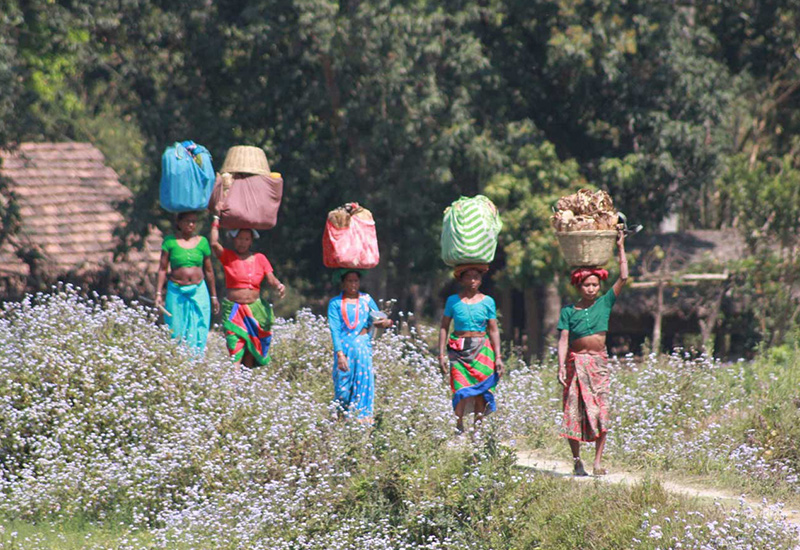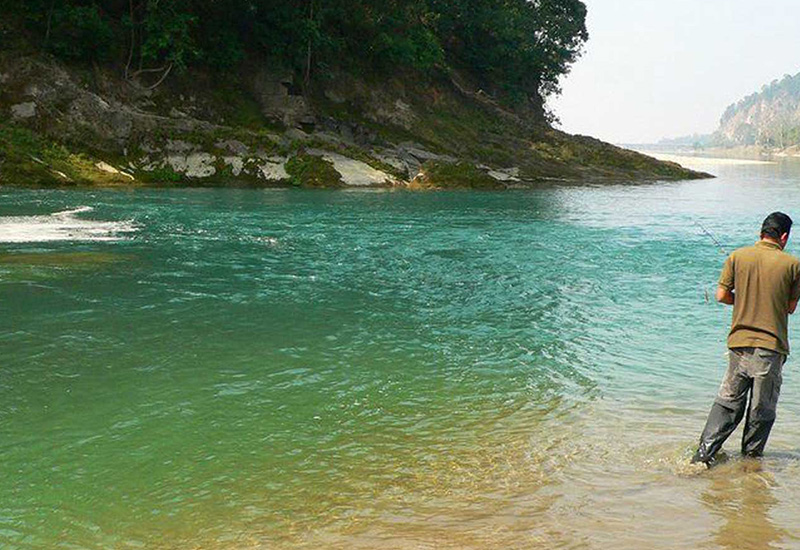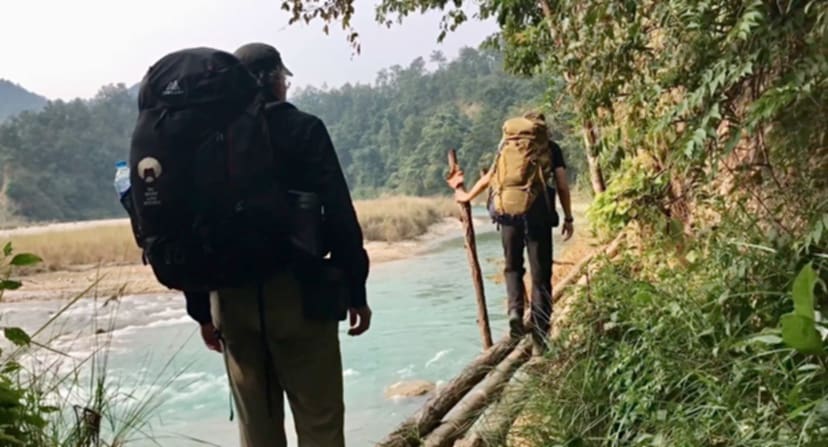Bardiya National Park
Area : 968 sq kmAltitude : 152m to 1441m
Introduction
Bardia National park is the largest national park in Nepal's lowland Terai covering an area of 968 sq km. The park is situated in Nepal's Western Terai and was established to protect representative ecosystems and conserve tigers and its prey species.Hotel and Resort In Bardia National Park are available for the domastic and foreign Tourists. Hotel in Bardia National Park and Resort in Bardia National Park provide jungle walk, Elephant safari, Jeep safari as well as the rafting in Karnali RiverHistory
1969 it was made a Hunting Reserve,1976 gazetted as the Karnali Wildlife Reserve.
1984 it was extended to include the Babai valley.
1988 the reserve was given the status of a National Park. 1997, an area of 327 km2 surrounding the park was declared as a buffer zone, which consists of forests, private lands Hotel and Resort in Bardia National Park.
Bardia National park and local communities jointly manage the buffer zone. Together they initiate community development activities and manage natural resources in the buffer zones.
Greater One-horned Rhinoceros were translocated from Chitwan National Park in 1986, 1991, 1999, 2000, 2001 and 2002.
The Babai Valley
The Babai valley extending from Parewa Odar to Chepang (bridge) was included into the park in 1984. The pristine valley is characterized by a rich biodiversity. The major vegetation and forest characteristics are wooded grassland and Riverine forest. The Babai river valley extends to the north easten border of the park providing an excellent habitat and corridor for several other wildlife species.Eco-System
FloraThe park offers a variety of experiences in its vast undisturbed wilderness. About 70% of the forest consists of Sal trees with a mixture of grassland and riverine forests. Sal leaves are used in festivals and as religious offering.
Fauna
More that 32 different mammals, 350 Species of bird
Large Mammals
Species include, Asian elephant, Greater one-horned Rhinoceros, Swamp deer, Spotted deer, Hog deer, Barking deer, Sambar deer, Black Buck, Blue bull, Wild Boar, Royal Bengal tiger, Leopard Golden Jackel, Striped Hyena, Sloth Bear and Gangetic dolphin.
Smaller mammals Langur monkey, Rhesus Macaque, Indian fox, Large Indian civet, Small Indian civet, Asian Palm civet , Jungle cat, Leopard cat, Fishing cat, Yellow- throated Marten, Smooth-coated Otter, Common Indian Mongoose, Indian Hare, Hispid Hare, Indian Porcupine, Giant Flying Squirrel, Indian Flying Fox Short-nosed Fruit bat, Indian Pipestrelle, Common Yellow bat, Hoarybellied Himalayan Squirrel, Five-striped Palm Squirrel, Fulvus Fruit Bat, Chinese Pangolin, Honey Badger, Grey Musk Shrew.
Reptiles
Gharial-Crocodile, Marsh mugger Crocodile, Indian Rock Python, King cobra,common cobra, rat snake, bandit Krait, common krait, Russll's viper,green pitviper.
Birds
Endangered birds found in the park are Bengal florican, lesser florican and sarus crane, the are to many species of birds list here. owls, small birds, water birds, birds of prey and Several migratory birds visit the park every year.
Seasons
Spring seasonFrom mid February to mid April is the most pleasant weather of the year. It is the best season for visiting the Terai and Bardiya, when There are few Mosquitoes and the tall elephant grasses have been cut making good visibility for Good animal sighting.
Dry season
From late April the temperature and humidity increases and can peak up into the 40c in late june just before the rains. Tiger sightings become more predictable around this time and there are more Mosquitoes, sun hats and light cloving.
Monsoon season
From mid July the hot sticky days are broken by the monsoon rains that lasts until late September. Village life is verdant and slow at this time of year and the least number of visitors come. there are Mosquitoes, and can be hard to stay, being quite hot and humid day and night, when it dos not rain, it is the rice planting time and deeper parts of the jungle are harder to access due to the rivers swell.
Autumn season
Through late september to November the heat and humidity quickly dissipates to make a much milder and pleasant climate, making it much easyer to take long walks through the jungle, it is the rice harvest time and and wheat planting time.There will still be some mosquitos about and the nights cooler.
Winter season
From early December to mid February The days are warm and the nights are cold. It can often be misty untill late in the mornings, some times for a few days at a time there can be cloud cover, which makes for chilly days spent near the fire, but no so bad when your walking, grass cutting time in the jungle, next to zero Mosquitoes, good animal sightings, bring Warm clothing.
Grass cutting time in bardiya
When?
The Karnali river
Starting its journey from near Mt Kilash and eventually merging with the Ganges, the longest river of Nepal. It's blue waters also provide the western boundary of the park, creating Riverine forests, it is the prime habitat for endangered wild life like the Gangetic dolphin, Crocodile, many water birds, fish and crustaceans. River activitiesThe fast flowing waters of the upper mid Karnarli also provide excellent rafting expeditions, as the boat leave the steep mountain valleys behind and enter the Terai the waters calm down and the expedition ends by or in the park. Jungle Boat rides specially for amimal sighting and seasonal Game fishing permits are also available on the river.
Culture
The Tharu ethnic group is native to this area. There are four differant of sub groups of tharu with there own distinct customs and langudges. Traditionally once they were jungle dwellers, beleved to be immune to malairia, living in the moqueto ridden flat lands (the thari) where few people daired travel. In the 1950s there was a succesful anti malairia program which opened up the Thari for settlers to move in, since that time slowly the jungle habitats and cultures have declined. Today many Tharu still live in there traditional long houses and live as subsistence farmers. They still continue to practise have their own hindu tribal religion and beliefs. Some of the Hotel In Bardia National Park and Resort In Bardia National organized cultural and traditional tharu activities.
JUNGLE WALK
Our jungle walks are tailored to your particular interests and can be half or full days. The walks take in viewing points overlooking water holes and grasslands where you can watch animals going about their daily routines undisturbed in the gloriously untamed vegetation. Guiding you will be our experienced naturalists who will answer your questions about the flora and fauna of this wild and beautiful park.

ELEPHANT RIDES
This is a unique way to experience the jungle allowing you to get closer to larger animals like tiger and rhino. The elephant rides can last from one to two hours with the government elephants, or three hours with the Tiger Tops elephants. During the safari you will be taken across rivers and through areas of bush, which are otherwise inaccessible. The elephants are driven by their experienced mahut (masters) and you will also be accompanied by a guide who will make sure you are well looked after.

JEEP SAFARIS
Jeep safaris can be arranged for those wishing to go deeper into the jungle.

WHOLE DAY BOAT RIDES
An enjoyable way to experience the Park's wildlife is to drift slowly down the network of Karnali's river ways. This is a relaxing wildlife trip, devoid of dangerous waters or rapids. You will be accompanied by an experienced guide and boatman, who, as you float along will point out the many different species of water birds and the Gharial crocodiles basking on sand banks. Deer, monkeys and rhino are common and if lucky, you might also see tigers and wild elephants as they come down to the river to drink.

CULTURAL VISITS
The lodge organizes a leisurely local walk in the nearby area of Thakurdwara; this is well worthwhile. There you will find the fascinating indigenous Tharu people living their rural lifestyle, some still occupying traditional long houses. This tour provides a rare opportunity of seeing natural, subsistance farming as practiced for centuries. The area is a reminder of how life was lived in by-gone ages from the animal husbandry to crop cultivation, where many things are still done by hand. During certain seasons, there is the possibility of watching their religious festivals and dances.

GAME FISHING THE KARNALI AND BABAI
The Karnali River is excellent for anglers. The Masheer ( a notorious fighting fish that can weigh up to 90 lbs) is in season is from January to April. Guests can also try fishing the indigenous Tharu way using different kinds of net to catch fresh water shrimp and crabs.

BIRD WATCHING
Bardiya is a bird watcher's paradise with many of the different species being seen in the Park and around the villages. We conduct specialized tours where you will be guided through the jungle by a bird expert to specific locations from where you will have the chance to observe birds such as king fishers and hornbills amongst many others.

BABAI VALLEY
The Babai Valley in Bardia National Park, once off-limits to all tourists, is now an exclusive gem waiting to be discovered. This untouched, remote valley is home to the stunning Babai River, which nourishes a thriving ecosystem filled with remarkable wildlife, including Asian elephants, Bengal tigers, sloth bears, Asiatic black bears, one-horned rhinoceroses, leopards, deer, and more. The river is also home to the mighty magar crocodiles, adding to the region's wild charm.
We offer a 4-night, 5-day walking safari where you'll camp under the stars in comfortable tents, complete with cozy bedding, and enjoy delicious meals and drinks of your choice. If you prefer a shorter escape, we also offer 2- to 3-night rafting trips. In this pristine setting, there’s no mobile signal, and the only human presence is a few army camps keeping watch over the wildlife, giving you the perfect opportunity to truly disconnect and immerse yourself in nature.
Bardia National Park, Nepal’s largest national park in the Terai, is largely contained within this hidden valley, offering an experience you won’t find anywhere else in the region. Despite the recent opening, the area remains far from crowded due to its remote location and the cost of activities, ensuring a peaceful and intimate wildlife adventure.
For your safety and peace of mind, we bring along a team of experienced staff, including jungle guides, cooks, and forest rangers, and carry first aid and emergency equipment just in case. You’ll be in great hands throughout your journey, ensuring a safe and unforgettable experience.
This is more than just a trip; it’s a chance to step into a world few have seen and to experience the wild heart of Nepal in a way that’s personal, intimate, and truly unforgettable. If you’ve ever dreamed of being surrounded by untamed nature, or if you’re looking for a genuine adventure that goes beyond the ordinary, the Babai Valley is calling. Don’t wait—your once-in-a-lifetime wildlife experience is just a step away.
